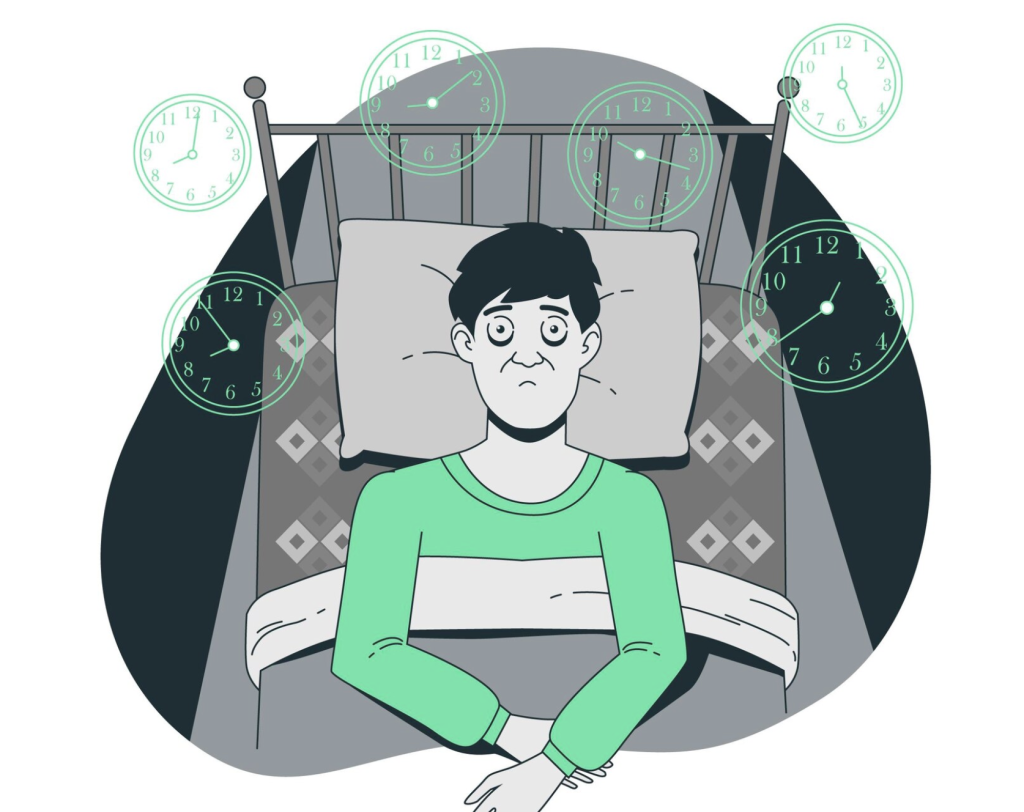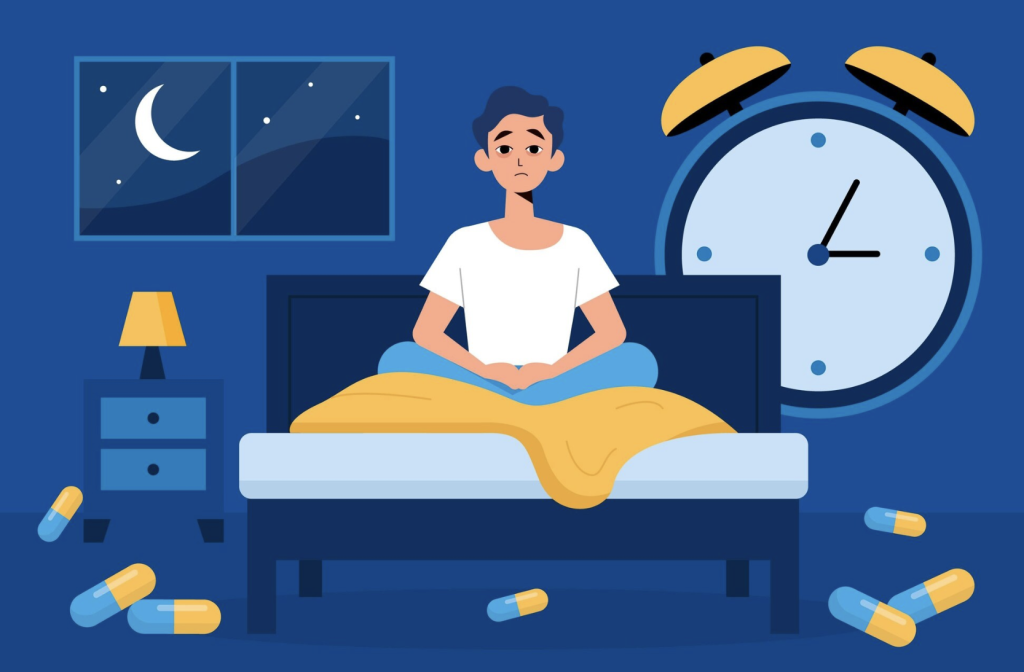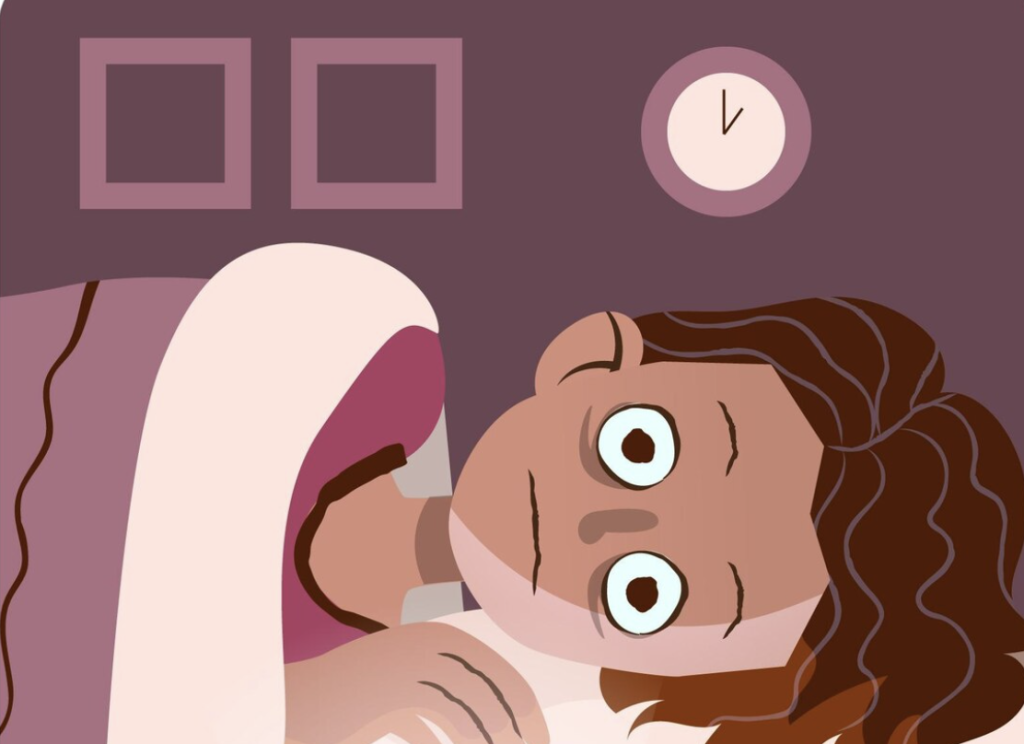
Introduction
Insomnia, the inability to fall asleep or stay asleep, is a common problem affecting millions of people worldwide. This condition can lead to various health issues, including fatigue, poor concentration, and mood disturbances. While prescription medications are available, many individuals seek natural remedies to avoid potential side effects and promote overall well-being. This guide delves into the causes, symptoms, and natural treatments for insomnia, providing practical solutions for achieving better sleep.
Understanding Insomnia
What is Insomnia?
Insomnia is a sleep disorder characterized by difficulty falling asleep, staying asleep, or waking up too early and not being able to go back to sleep. It can be classified into two main types:
- Acute Insomnia: Short-term insomnia that lasts for a few days to a few weeks, often triggered by stress or a significant life event.
- Chronic Insomnia: Long-term insomnia that occurs at least three nights a week for three months or longer, often linked to underlying health conditions or ongoing stress.
Symptoms of Insomnia
The symptoms of insomnia can vary but typically include:
- Difficulty falling asleep at night
- Waking up during the night
- Waking up too early
- Not feeling well-rested after a night’s sleep
- Daytime tiredness or sleepiness
- Irritability, depression, or anxiety
- Difficulty paying attention or focusing on tasks
- Increased errors or accidents

Causes of Insomnia
Insomnia can be caused by a variety of factors, including:
- Stress: Worries about work, school, health, finances, or family can keep the mind active at night.
- Anxiety and Depression: Anxiety disorders and depression can interfere with sleep.
- Poor Sleep Habits: Irregular sleep schedules, naps, stimulating activities before bed, and uncomfortable sleep environments can contribute to insomnia.
- Medical Conditions: Chronic pain, asthma, diabetes, heart disease, and other medical conditions can affect sleep.
- Medications: Certain medications can interfere with sleep, such as antidepressants, medications for asthma or blood pressure, and over-the-counter pain medications.
- Caffeine, Nicotine, and Alcohol: Caffeine and nicotine are stimulants that can interfere with sleep, while alcohol can disrupt sleep patterns.
- Eating Too Much Late in the Evening: Having a large meal close to bedtime can cause discomfort and interfere with sleep.
Natural Remedies for Insomnia
Natural remedies can effectively improve sleep quality and manage insomnia. These remedies focus on creating a conducive sleep environment, promoting relaxation, and supporting the body’s natural sleep-wake cycle.
1. Valerian Root
Benefits:
Valerian root is a herb commonly used to treat sleep disorders. It contains compounds that have a sedative effect, promoting relaxation and improving sleep quality.

How to Use:
- Valerian Tea: Steep dried valerian root in hot water for 10-15 minutes. Drink this tea 30 minutes to an hour before bedtime.
- Valerian Supplements: Valerian root supplements are available in capsule form. Follow the recommended dosage on the packaging.
2. Lavender
Benefits:
Lavender is known for its calming and relaxing properties. It can help reduce anxiety and improve sleep quality.
How to Use:
- Lavender Essential Oil: Diffuse lavender essential oil in your bedroom before bedtime. Alternatively, add a few drops to a warm bath.
- Lavender Tea: Brew lavender tea by steeping dried lavender flowers in hot water. Drink this tea before bed to promote relaxation.
- Lavender Sachets: Place lavender sachets under your pillow or near your bed.
3. Chamomile
Benefits:
Chamomile is a herb with mild sedative effects that can help relax the body and mind, making it easier to fall asleep.
How to Use:
- Chamomile Tea: Brew chamomile tea by steeping dried chamomile flowers in hot water. Drink this tea about 30 minutes before bedtime.
- Chamomile Essential Oil: Diffuse chamomile essential oil in your bedroom or add a few drops to a warm bath.
4. Magnesium
Benefits:
Magnesium is a mineral that plays a crucial role in muscle relaxation and nerve function. It can help improve sleep quality and reduce symptoms of insomnia.
How to Use:
- Magnesium Supplements: Magnesium supplements are available in various forms, such as magnesium citrate or magnesium glycinate. Follow the recommended dosage on the packaging.
- Magnesium-Rich Foods: Include magnesium-rich foods in your diet, such as leafy green vegetables, nuts, seeds, and whole grains.
5. Melatonin
Benefits:
Melatonin is a hormone that regulates the sleep-wake cycle. Supplementing with melatonin can help regulate sleep patterns and improve sleep quality.
How to Use:
- Melatonin Supplements: Melatonin supplements are available in tablet form. Follow the recommended dosage on the packaging, typically taken 30 minutes before bedtime.
6. Passionflower
Benefits:
Passionflower is a herb known for its calming effects. It can help reduce anxiety and improve sleep quality.
How to Use:
- Passionflower Tea: Steep dried passionflower in hot water for 10-15 minutes. Drink this tea before bedtime to promote relaxation.
- Passionflower Supplements: Passionflower supplements are available in capsule form. Follow the recommended dosage on the packaging.
7. Warm Milk and Honey

Benefits:
Warm milk contains tryptophan, an amino acid that promotes sleep, while honey can help regulate the release of insulin, allowing tryptophan to enter the brain more easily.
How to Use:
- Warm Milk with Honey: Heat a cup of milk and add a teaspoon of honey. Drink this mixture before bedtime to promote sleep.
8. Tart Cherry Juice
Benefits:
Tart cherry juice is a natural source of melatonin and can help improve sleep duration and quality.
How to Use:
- Tart Cherry Juice: Drink a glass of tart cherry juice about an hour before bedtime.
Lifestyle Changes to Improve Sleep Quality
In addition to natural remedies, certain lifestyle changes can significantly improve sleep quality and reduce symptoms of insomnia.
1. Establish a Regular Sleep Schedule
Go to bed and wake up at the same time every day, even on weekends. This helps regulate your body’s internal clock and improves sleep consistency.
2. Create a Relaxing Bedtime Routine
Establish a calming pre-sleep routine, such as reading a book, taking a warm bath, or practicing relaxation techniques like deep breathing or meditation.
3. Make Your Bedroom Conducive to Sleep
Ensure your bedroom is a quiet, dark, and cool environment. Use blackout curtains, earplugs, or a white noise machine if necessary. Invest in a comfortable mattress and pillows.
4. Limit Exposure to Screens Before Bed
The blue light emitted by phones, tablets, computers, and TVs can interfere with your body’s production of melatonin. Avoid using these devices at least an hour before bedtime.
5. Be Mindful of Your Diet
Avoid large meals, caffeine, and alcohol before bed. Opt for light snacks if you’re hungry, such as a banana or a handful of almonds.
6. Stay Active
Regular physical activity can help you fall asleep faster and enjoy deeper sleep. Aim for at least 30 minutes of moderate exercise most days of the week, but avoid vigorous exercise close to bedtime.
7. Manage Stress and Anxiety
Practice stress-reducing techniques such as yoga, meditation, and mindfulness. Journaling or talking to a friend or therapist can also help manage anxiety.
Precautions and Considerations
While natural remedies can be highly effective in managing insomnia, it’s essential to approach them with caution and awareness.
- Consultation with Healthcare Providers: Always consult with a healthcare provider before starting any new treatment, especially if you have underlying health conditions or are taking other medications.
- Quality of Ingredients: Ensure the quality and purity of ingredients used in natural remedies. Choose organic herbs and supplements to avoid contaminants.
- Proper Dosage: Be mindful of dosages, as even natural remedies can cause harm if used excessively. Follow recommended guidelines and consult resources for accurate information.
- Allergic Reactions: Be aware of potential allergic reactions. Perform a patch test when using a new topical remedy and start with small doses for oral remedies.
- Research and Evidence: While many natural remedies have historical and anecdotal support, seek out scientific research to validate their efficacy. Reliable sources include peer-reviewed journals and reputable health organisations.
Conclusion
Insomnia is a common sleep disorder that can significantly impact daily life. Natural remedies offer a safe and effective way to improve sleep quality and manage insomnia. By incorporating remedies such as valerian root, lavender, chamomile, magnesium, melatonin, passionflower, warm milk with honey, and tart cherry juice, individuals can find relief and support their overall well-being. Additionally, adopting healthy lifestyle changes, such as establishing a regular sleep schedule, creating a relaxing bedtime routine, making your bedroom conducive to sleep, limiting exposure to screens before bed, being mindful of your diet, staying active, and managing stress and anxiety, can further enhance sleep quality. Always approach natural remedies with caution, consult with healthcare providers, and ensure the quality and proper usage of ingredients to achieve the best results.
